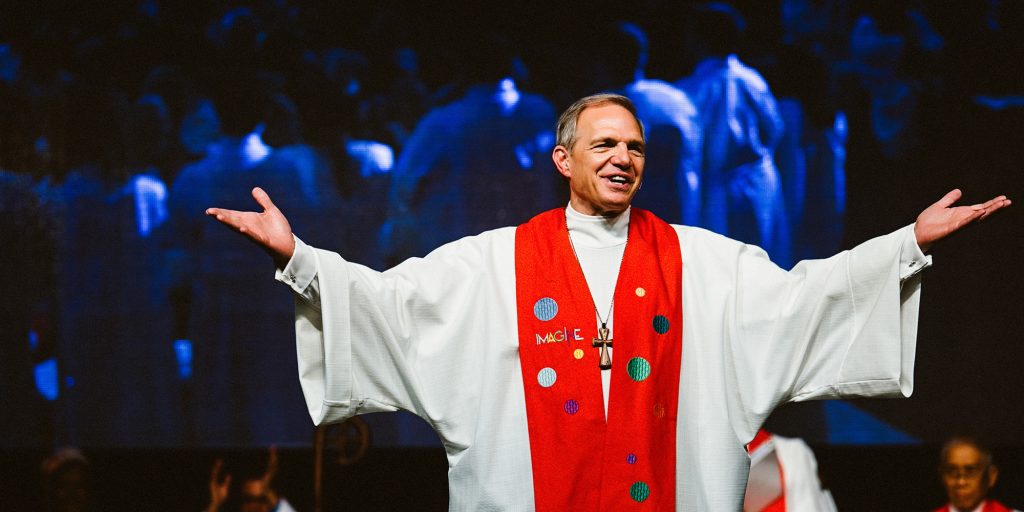I have five different ways to get from my office to our treasurer, John Cardillo’s office. The fastest and most direct way is down the center corridor and make a left. I can make a left out of my office and go along an outside corridor which allows me to say hi to communication, property and benefits staff. I can make a right, a longer route, and say hi to our foundation, A Future With Hope and connectional ministries staff. I can take the stairs to the first floor and walk to the back of the building and take the back set of stairs to the second floor and proceed to John’s office. I take this route when I want a little exercise, particularly late in the afternoon. I can take the elevator to the first floor and walk up the back set of stairs. I never take this route because I like taking the stairs. There are five different ways to John’s office. I use four of them for specific purposes that include exercise or greeting people or an urgent matter.
What would it be like if our conference policy said that I could only use one prescribed route to John’s office?
Today is the final article in a series about our identity crises in The United Methodist Church. The two previous articles talked about how The United Methodist Church (the denomination) is not a church but a form of government and the second article how it’s not a nuclear family but an extended family. Today I want to explore if United Methodism is a set of behaviors or a way of being.
The 1868 Book of Discipline, Methodism’s book of policies and practices was 3 ½ inches by five inches, the size of a postcard and 200 pages. Our present Book of Discipline is 5 ½ inches by 9 inches and more than 600 pages. The 1868 Discipline has the liturgies and hymns of the church along with our polices. Today’s Discipline does not include the liturgies and hymns. Other than the sheer increase in policies and laws of the church is that early on, the Book of Discipline was to help a person be a disciple in the Wesleyan tradition.
Today’s Book of Discipline focuses on behavior rather than being, on policies rather than values, on what not to do rather than what to do to be a disciple of Jesus Christ. It focuses more on how than attitude, more on laws than values. All organizations need appropriate policies but we have lost a sense of balance. Jesus’ teaching in the Gospels said very little about how and a great deal about what we should be doing. Even the laws that Jesus talked about were lessons in values – love God and love your neighbor, do unto others as you would want them to do to you, pray for those who persecute you.
As we have gotten more prescriptive, we have used the Judicial Council (the church’s Supreme Court) to resolve more of our church’s disputes. Today there are generally over 2,000 pieces of legislation to our General Conference (our congress) each time it meets. Annual conferences have a greater ability to be more values focused; congregations even more so, and the greatest degree of sharing and living values is found in small groups focused on supporting and encouraging one another to live a disciple’s life in the Wesleyan tradition. Think of it, our small groups are more like the early Books of Discipline.
Our identity grows out of the life of Jesus Christ. It is nourished and enriched in the congregation by focusing more on being, values, and a way of life rather than elevating laws and policies. Healthy discipleship recognizes the best form of governance is treating others as Christ taught us to treat one another, that the best policies protect the poor, the outcast, the lost and the oppressed, and the church has its greatest impact as it gets smaller – small groups, mission teams, Bible studies where people are focused on nurturing each other’s soul, supporting each other in their discipleship walk and serving the world.
When lay and clergy leaders are asked what are the values of The United Methodist Church, the top six listed are:
- God’s grace through Jesus Christ is available to everyone
- Community and world mission engagement
- Open communion table for Christians of all ages and from all denominations
- Scripture as foundational for our belief and living
- The needs of the poor are addressed
- Fellowship and community among disciples
These six values are foundational for United Methodists. You cannot legislate these. As soon as you begin to establish policies for how you will fellowship or how to experience grace we take all of the excitement out of faith and being a Wesleyan disciple. Certainly we need policies and laws to maintain healthy boundaries but don’t over legislate.
What’s a United Methodist to do? Focus on our core values, engage in small groups and mission teams, and don’t expect The United Methodist Church in the next town or in the Philippines to practice being a United Methodist just like your experience. If you do need to develop policies in your congregation, ask how it will help us better live our values. If you have to turn to the Book of Discipline, don’t use it as a book to pound into people what you believe makes sense, but understand it through the lens of how it helps us be a disciple of Jesus Christ and live our values. Move from governing to mission, from seeing everyone like your family to embracing diverse expressions of faith, and value values as a guide for your living.
Keep the faith!
John
Bishop John Schol
The United Methodist Church
of Greater New Jersey

